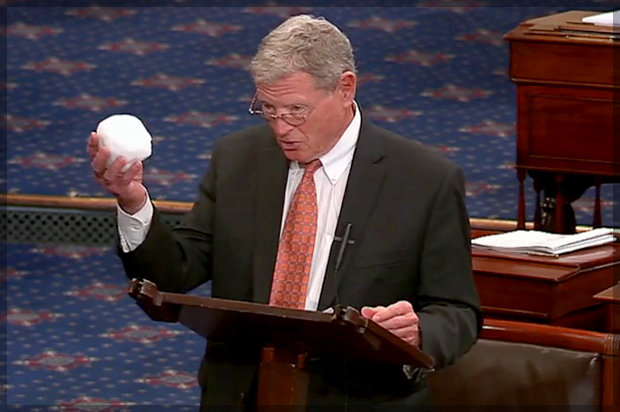Remember when Republicans’ biggest argument against the U.S. pursuing any type of action on climate change was that, without us being able to trust other countries to do the same, anything we achieved would basically be meaningless? That’s been a bit of a harder sell since President Obama reached a historic deal with China: both countries, which are collectively responsible for 40 percent of the world’s greenhouse gas emissions, pledged to take significant steps to reduce them.
GOP naysayers, of course, were quick to argue that China couldn’t be trusted to follow through on its end of the deal. But as Obama pushes his climate agenda in the lead-up to the international negotiations coming at the end of this year, they’re hard at work on a new line of attack: convincing the rest of the world that the U.S. is not to be trusted, either.
The Wall Street Journal has the latest on what can best be characterized as Tom Cotton-style diplomacy, given its stated similarities to the letter to Iran organized by the Republican senator. That note, signed by 47 GOP leaders, explained that the Obama administration wouldn’t be able to hold up its end any sort of nuclear agreement it made — because Congress would be certain to torpedo it. And since that went over so well, it seems to have given Congress’ top global warming truthers some ideas.
“The Tom Cotton letter was an educational effort,” Sen. James Inhofe, who literally wrote the book on climate denial, told the Wall Street Journal in an interview. Similar tactics, he said, could be used to undermine global climate negotiations. Other countries think “if the president of the United States says something, it’s just automatic,” Inhofe explained, in what may not be the most accurate assessment of how other countries understand the U.S. political system. “His letter was over there saying, ‘the president says he can do this; he can’t do this.’”
Inhofe’s comments, alas, only make explicit what Mitch McConnell has already been hard at work doing. The Senate Majority Leader has been lobbying states to boycott the EPA’s forthcoming rule for coal-fired power plants, a keystone in the United State’s goal of reducing carbon emissions 26 percent below 2005 levels by 2025. The attack has dual purposes: first, to simply prevent the EPA from carrying out what he incorrectly sees as its “war on coal,” and second, as the New York Times reported, to “create uncertainty in the minds of other world leaders as to whether the United States can follow through on its pledges to cut emissions,” thus giving them a strong incentive not to offer pledges of their own. According to the WSJ, McConnell, too, indicated in a recent interview that the bipartisan compromise giving Congress power of review over a nuclear deal with Iran would be a good precedent for Republicans’ climate change strategy.
As a reminder, Republican climate change strategy is to do nothing about climate change. And Republican leaders have undoubtedly been distressed that the Obama administration’s figured out how to facilitate an international climate deal without having to deal with Congress. The plan, in a nutshell, is to eschew a legally binding treaty, which requires the approval of a two-thirds Senate majority, and to sign a “politically binding” deal instead. As the Times reported in August:
American negotiators are instead homing in on a hybrid agreement — a proposal to blend legally binding conditions from an existing 1992 treaty with new voluntary pledges. The mix would create a deal that would update the treaty, and thus, negotiators say, not require a new vote of ratification.
Countries would be legally required to enact domestic climate change policies — but would voluntarily pledge to specific levels of emissions cuts and to channel money to poor countries to help them adapt to climate change. Countries might then be legally obligated to report their progress toward meeting those pledges at meetings held to identify those nations that did not meet their cuts.
“There’s a strong understanding of the difficulties of the U.S. situation, and a willingness to work with the U.S. to get out of this impasse,” said Laurence Tubiana, the French ambassador for climate change to the United Nations, told the Times. “There is an implicit understanding that this not require ratification by the Senate.”
According to the WSJ, Obama administration officials are pretty happy with the way climate talks are going, and they’re fairly sure we’ll be able to meet our emissions goals with the laws we already have. But they may have underestimated just how determined Republican leaders are to watch the world burn — in a worst-case scenario, experts told Salon, they could end up causing the entire effort to collapse. Todd Stern, the special envoy for climate change at the State Department, told the Journal that other countries have been asking whether, amid GOP opposition, the U.S. will be able to honor its commitment.
Stern said he assures them that we absolutely will. But Republicans, it seems, would rather we be seen as liars — and set us on a course toward planetary disaster — than allow us to lead on climate.

